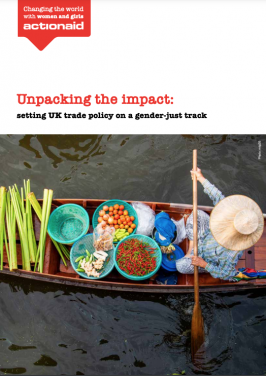Unpacking the impact: setting UK trade policy on a gender-just track
ActionAid UK’s new report looks at the impacts of free trade agreements on women and girls around the world. It also lays out the steps the UK Government can take to ensure its trade arrangements align with its international commitments on gender equality.
Executive summary
While trade has been an important driver of job creation globally and a key factor in supporting the development of economic strategies and domestic markets, the rise of trade liberalisation has created winners and losers.
A wealth of research, including by ActionAid, has demonstrated that free trade affects different sections of the population, including women and men, differently. This is due to entrenched social and economic inequalities that affect human rights and the lives of women around the world. Because of unequal trading relationships between the Global North and the Global South, women in the Global South are more likely to bear the brunt of the negative impacts of free trade.
These gendered impacts need to be fully understood if the effects of trade on women’s lives and human rights are to be adequately addressed by policymakers. ActionAid’s new report proposes that the best way of understanding these impacts is by the creation and implementation of robust, women’s-rights-focused Sustainability Impact Assessments (SIAs).
The report sets out nine guiding principles as the UK considers a women’s rights-focused approach to SIAs and offers seven recommendations that propose actions for the UK Government to take as part of its overall trade policy. It also lays out evidence and examples of the impacts that trade has on women and girls, particularly the most economically and socially marginalised in southern countries, and also draws on international examples of effective impact assessments.
